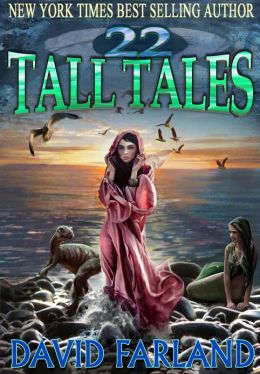
APB-SAL is a blog about education, science, science education, fiction, science fiction, literature, literary stories, poetry, and anything else that strikes the blogger's fancy. NOTE: This blog interrogates art. It rarely make moral proclamations. For that attend the church or politician of your choice. This blog concerns aesthetics, not propaganda. Consider this as interviews with books where the interviewer presents interviewees, so you get what you need to do your own thinking.
Thursday, April 18, 2013
Review of Twenty-two Tall Tales
Of 22 Tall Tales, I have already reviewed over half of these stories in The Best of David Farland: Volume 1 and 2, Three Tales ("The Stonemother's Curse," "At the Virgin's Doorstep"and "Sweetly Dreams the Dragon"), and "Against Eternity," which is packaged with one of the Nightingale songs.
I feel like a lad who's worked hard at collecting all of the songs of an artist and then bam! A retrospective album comes out, negating all that hard work of collecting. However, I had asked for a collection, and here it is at last. The hunt is over. A cause for celebration. Bring out the wine and fatted calf!
Among the sixteen SF and fantasy works here are collected three Star Wars tales and four "mainstream" works. If you're counting, that makes twenty-three, which intriguingly makes one not a tall tale. Clever. I love literary games. The volume closes with the bonus essay, "The Stress Induction/Reduction Theory of Storytelling."
"The Sky Is an Open Highway" is a rather complex, political tale. You may have to read it a few times to sort out the factions (or find someone who's done the work for you). Abudoh supplies carbohite to Kwon, a smuggler who blows up planet's continent for reasons unfathomable to Abudoh. This time Abudoh and the rebel group, Pentat, blow up Kwon, in part because he has been destructive but perhaps, more so, to show the Pentat's rulers that they are the true rulers of the planet. There are some touches here involving the men's different responses to the native life, and Abudoh's own judgment of himself and Kwon--as well as Kwon's surprising reaction when Abudoh, a slave, makes an overture of friendship to a powerful prince.
"Charley in the Wind" Charley is the narrator's new friend who had been bullied at school, so the narrator helps him. They become blood brothers. The narrator doesn't cry after his father taught him to kill a puppy that had been run over. Charley wants to be The Thing, indestructible. When Ben, Charley's brother, gets burned as they dance across a fire they built, Charley takes off before his father could discipline him. He teaches Charley not to cry, but Charley doesn't take it in quite the way expected.
Steve, his brother Mike, and their father go hunting in "No Bird". The father repeatedly tries to get Steve to shoot, but the rifle doesn't fit well and one eye is bandaged. They go on a shooting spree of ugly vultures, killing twenty-eight eating carp along the river. Steve finds a vulture, half-alive, and it tries to peck his eye out. "[N]o bird, no bird shall ever eat me."
An adult, Steve calls his brother, a SWAT team member, who has just shot and killed a man who went berserk at a daycare center. He is unfazed. Back at Steve's guard-tower job, he talks to a guard speaks with a little too much relish about killing ten Vietnamese on one occasion during the war. A guard wants to shoot a bird that keeps hitting the guard tower. He's given the okay, but the bird wasn't as big as he'd though
During a prison break, Steve doesn't react zealously, which makes him a hit with his boss and his wife--himself as well, no doubt--even if he's not as popular with the other guards. Interesting meditation on restraint.
Of these resonant tales, I suspect "After a Lean Winter" will become a classic, but all are resonant and have an emotional punch.

No comments:
Post a Comment